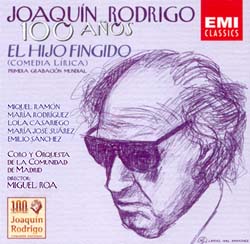EMI
Classics
Rodrigo - El hijo
fingido

Joaquín Rodrigo
El hijo fingido
Lyric Comedy in a
prologue and 2 acts
libretto adapted by Jesús M. de Arozamena and
Victoria Kamhi
from the play by Lope de Vega
Leonardo - Miquel Ramón,
Ángela - María Rodríguez, Doña Bárbara -
Lola Casariego, Rosita, la Inca - María José Suarez, Dominga -
María Rey-Joly, Beltrán - Emilio Sánchez, Don Octavio -
Enrique del Portal, Don Ventura - Luis Álvarez, Capitán Fajardo -
Carlos López; Basilisa - Carmen Haro
Chorus and Orchestra of
the Comunidad de Madrid
Florence Dumont (harp); John Stoke (cello)
c.
Miguel Roa
EMI Classics 5 57127 2
Timing:
79 minutes
The hope was that Joaquín Rodrigo would be with us to hear the planned Madrid revival of the lyric comedy El hijo fingido (1964), his major music theatre score. Sad to say, he died approaching his 98th birthday nearly two years ago, so this studio recording of the Teatro de la Zarzuela production has become a centennial tribute to his memory. Like Doña Francisquita, El hijo fingido ("The False Son") is a zarzuela version of a Lope de Vega comedy, but unlike Romero and Shaw Rodrigo's librettists kept Lope's original setting and period intact. The music, as in Penella's Don Gil de Alcalá (1932) or Guridi's La condesa de la aguja y el dedal (1950), is rooted in nostalgic evocation of the Golden Age.
Rodrigo's score is characteristically full of light and air, clear, clean and easy on the ear. There are hints of Doña Francisquita, La villana and La tempranica, a work which Rodrigo admired greatly. The style, though, is unmistakably his own, at least in the orchestral numbers, the overture, interludes and dances. Hear a couple of bars, for instance, of the charming variations on a ground with harp solo (Track 15, with soloist Florence Dumont) and you'll spot your composer. The vocal numbers are more anonymous, the sung lines grateful but generic. In some of the earlier numbers Rodrigo does veer towards perfunctory pastiche - until some fleck of spiced harmony or little woodwind comment reminds us of our man. As the plot darkens, nocturnal romanzas and dúos evoke an older, deeper Spanish world of canto jondo and the Moors, and Rodrigo seems more consistently drawn in by his subject.
The performance, by the cast of the Teatro de la Zarzuela production under Miguel Roa, is pristine. María Rodríguez deploys her vocal individuality and dramatic instinct to touching effect as the heroine, Ángela; and although baritone Miquel Ramón is comparatively pallid as Leonardo, his secure musicality and technique are set no great demands by the composer's vocal writing. The rest of the cast are equally effective. Roa's direction is unfailingly alert and alive, the orchestral playing captures Rodrigo's glinting play of pastel colours with great elegance. Mention should be make of John Stoke's sensitive playing in a gitana-style rhapsody for soprano and his solo cello late in the score. The recording quality succeeds nicely in capturing the spare, clean textures of this gently effective music.
Rodrigo's El hijo fingido may ultimately come to be heard as a cool reflection on the sunset years of the zarzuela, rather than as a central example of that tradition. None the less, its limpid lines, and especially its highly personal orchestral imaginings, make it well worth hearing in its own right, both for zarzueleros and admirers of its remarkable composer.
© Christopher Webber
2001